#maggie wadey
Text
"THE BUCCANEERS" (1995) Review
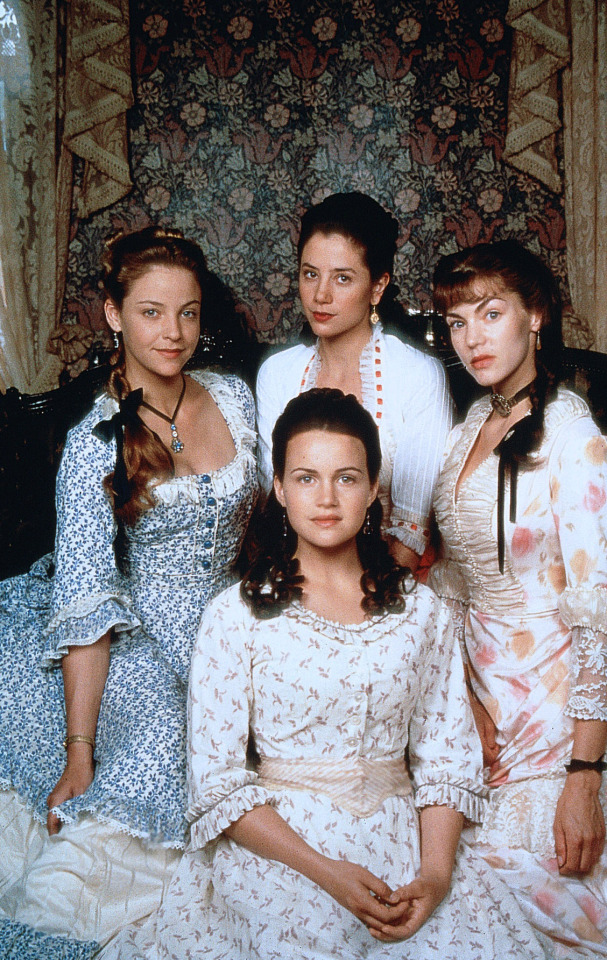
"THE BUCCANEERS" (1995) Review
Years ago, I had anticipating watching for the first time, "THE BUCCANEERS", the 1995 television adaptation of Edith Wharton’s last novel. After all, I have been a major fan of "THE AGE OF INNOCENCE", Martin Scorcese’s 1993 adaptation of Wharton’s award-winning 1920 novel for years. But my eager anticipating nearly ebbed away, when I discovered that "THE BUCCANEERS" only managed to rouse a lukewarm reception from many television critics.
The five-part miniseries turned out to be an unusual production from the BBC. One, it was based upon a novel written by an American author – namely Edith Wharton. There have been other British television productions based upon the literary works of an American, but they are very rare. Another interesting aspect of Wharton’s "The Age of Innocence" is that the author did not finish it, due to her death at the age of 75. Fifty-six years later, Wharton scholar Marion Mainwaring finished the novel, which was published by Viking. Around the same time, the BBC hired screenwriter Maggie Wadey to adapt and finish the novel for the television adaptation. As a result the novel has two slightly different endings. Another aspect of this miniseries that struck me as unusual was that instead of hiring British actresses to portray four of the five leads, the BBC hired four Amercian actresses – Carla Gugino, Mira Sorvino, Alison Elliott and Rya Kihlstedt.
The plotline for "THE BUCCANEERS" is very simple. The story begins in 1873 Newport, Rhode Island; in which two sisters of a noveau riche businessman and their two friends are introduced – Virginia "Ginny" and Annabel "Nan" St. George, Conchita "Connie" Closson and Elizabeth "Lizzy" Elmsworth. Whereas the Brazilian born Conchita manages to snare Lord Richard Marabel, the dissolute second son of the Marquess of Brightlingsea, the other three girls struggle to find a place amongst the members of old New York society. When a prank committed by Ginny and Lizzy backfires, Nan’s English governess Laura Testvalley proposes to Mrs. St. George that Ginny and Nan have a London season amongst the upper-class British. She argues that their acceptance by the British high society would assure them a place amongst the upper-class New Yorkers. Due to their friendship with the vibrant Conchita, Virginia and Annabel are introduced to Lord Richard’s family – the impoverished Brightlingseas and their neighbors, the equally impoverished Sir Helmsey Thwaite and his son Guy. As they get settled to conquer British society, Ginny and Nan are surprised by the arrival of Lizzy, who has arrived in Britain for her own season.
Although the girls’ original purpose for visiting Britain was to enjoy a London season, a friend of Laura Testvalley has other plans for them. Thirty years earlier, the American born Jackie March had been engaged to a British aristocrat – namely the very young Lord Brightlingsea, who abandoned her at the altar. Miss March remained in Britain and became something of a sponsor/matchmaker for young society girls. It was Miss March who recommended that the visiting Americans rent a villa owned by one of her former sponsors, Lady Idina Hutton. She also recommended that the girls do more than just enjoy a London season in order to impress old New York society. She recommended that they consider marrying into upper-class British society. Miss March’s plans eventually come to fruition:
*Virginia or namely her father’s wealth attracted the attention of Lady Idina Hutton’s lover and Lord Richard’s older brother, Lord Seadown.
*Lizzy ended up marrying a self-made aspiring politician named Hector Robinson
*Annabel fell in love with Guy Thwaite, but ended up marrying the very wealthy Julian Folyat, Duke of Trevennick; when Guy left Britain to find his fortune in South America.
As I had stated earlier, most critics were not initially kind to "THE BUCCANEERS". Most British critics dismissed it as a costumed soap opera of the second-rate kind, with an ending that had been "Hollywoodized" (happy ending). These same critics also accused the miniseries of mocking the British aristocracy. The American critics, at least those who considered themselves Wharton purists, accused the miniseries’ screenwriter, Maggie Waddey, of changing the elements of the author’s story by including topics such as marital rape and homosexuality. Personally, I found all of these arguments irrelevant. Most dramas about personal lives – whether first-rate or not – tend to possess soap-operish elements. This hostility toward soap operas has always struck me as infantile and irrelevant. And why are all Hollywood productions guilty of having a happy ending, when that has not been the case? Other literary works and their adaptations have mocked the British aristocracy. Why was there such a big hullabaloo over how the aristocracy was portrayed in this particular story? As for the additions of marital rape and homosexuality, these elements did no harm to the story, as far as I am concerned. And I must admit that I have become increasingly weary of demands that all movie or television adaptations should be completely faithful to their literary source. Such demands strike me as impractical.
My complaints about "THE BUCCANEERS" are very few. In fact, I only have two. The first time I ever saw actress Gwen Humble on the television screen was in a miniseries called "THE REBELS", an adaptation of a John Jakes novel. Although I had no problems with her performance in that particular production, I must admit that I had a problem with her performance as Virginia and Annabel’s mother, Mrs. St. George. I understand that Mrs. St. George was supposed to be a shallow and somewhat silly woman. But I feel that Humble went a little too far in conveying those certain traits. Her performance struck me as exaggerated and a little amateurish. Another problem I had with "THE BUCCANEERS" is a rather minor one. It has to do with Virginia’s husband, Lord Seadown. His father is a marquess – which is ranked somewhere between a duke and an earl (count). As the eldest son, he is entitled to a courtesy title. But what was Seadown’s courtesy title? His younger brother was called Lord Richard Marable, which is correct for the younger son of a marquess. The courtesy title for the eldest son of a marquess is usually an earldom – namely Earl of Something. Was Seadown’s name a courtesy title - Earl of Seadown? Or was he supposed to be regarded as Lord Seadown Marable? If the latter, what was the courtesy title he used? I found it all slightly confusing.
However, "THE BUCCANEERS" has been one of my all time favorite miniseries, ever since I first saw it. And there is so much about it that has made it such a favorite of mine. One, producer-director Philip hired a production crew that did justice to Wharton’s story. The miniseries featured some elegant locations that served as the story’s various settings. Some of these locations included Castle Howard, Burghley House and Newport, Rhode Island. I also enjoyed Remi Adefarasin’s photography. It had a deep and rich color that did justice to a story filled with emotions and passion. Colin Towns provided an elegant and entertaining score that remained memorable for me, since the first time I heard it years ago. But it was Rosalind Ebbutt’s costumes that really blew my mind. She provided exquisitely outfits that were beautiful and elegant – especially those for the lead actresses. More importantly, her costumes not only reflected the fashions wore by the American and British upper-classes during the 1870s, they also reflected the change in the main characters’ status and in women’s fashion throughout the decade, as the following photographs show:
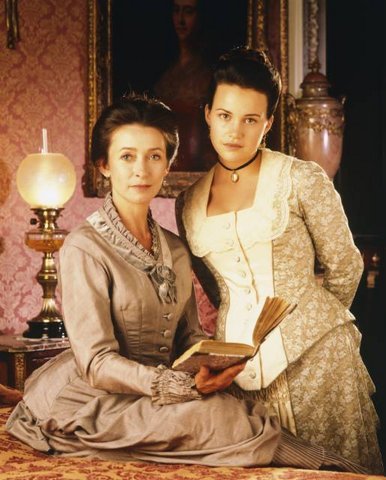
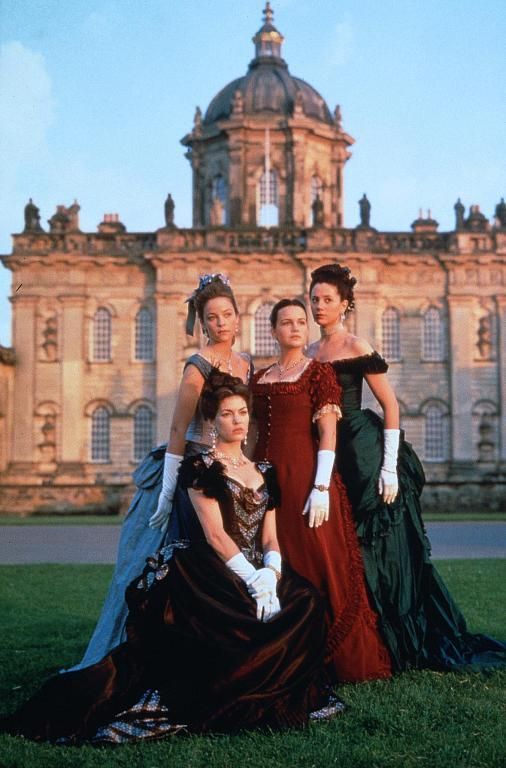
Another one of the major virtues of "THE BUCCANEERS" turned out to be its cast. Wharton’s novel is filled with interesting characters. And Saville and his casting director did an excellent job in finding the right actor/actress for the right role. Aside from Gwen Humble’s portrayal of Mrs. St. George, there were so many first-rate performances in the miniseries that it would take me another article just to describe them. But the supporting performances that stood out for me came from the likes of Sheila Hancock, whose portrayal of the Dowager Duchess of Trevenick struck me as an expert mixture of cool haughtiness, sharp wisdom and long suffering; Michael Kitchen, who skillfully conveyed both the charming and shallow nature of Sir Helmsley Thwaite; Jenny Agutter, who was excellent as Lady Idina Hatton, Lord Seadown’s insecure and tragic mistress; Dinsdale Landen and Rosemary Leach, who both portrayed the Marquess and Marchioness of Brightlingsea with a mixture of class haughtiness, charm and great humor; Peter M. Goetz, who seemed to personify the self-made 19th century American businessman; and Connie Booth, who gave one of her best performances as the ambitious and sharp-minded Jackie March.
Richard Huw gave a humorous, yet intelligent performance as Hector Robinson, the ambitious young Member of Parliament who ends up winning Lizzy Elmsworth’s hand. And Mark Tandy was pretty solid as Lord Brightlingsea’s heir, the mercenary Lord Seadown who marries Virginia for Colonel St. George’s money. I was very impressed by Ronan Vibert’s portrayal of the dissolute Lord Richard Marabel, Conchita’s husband and Lord Brightlingsea’s younger son. But the two male performances that really impressed me came from Greg Wise and James Frain. The latter portrayed the haughty Julian Duke of Trevenick, who manages to win the hand Annabel St. George (much to the surprise of her governess), before alienating her with his lack of skills as a husband. Frain could have easily portrayed Julian as a one-note villain, especially when one considers the act of marital rape that his character committed against his wife in Episode Three. Being the skillful actor that he is, Frain conveyed all facets of Julian’s personality – both the good and the bad. And his assertion near the end of Episode Four that he is "not a monster" may have been one of Frain’s finest moments on screen. Greg Wise probably gave one of what I consider to be three of his best career performances in his portrayal of Guy Thwaite, Sir Helmsley’s only son. His Guy could have been one of your typical handsome, romantic heroes. But Wise did an excellent job in revealing how Guy’s insecurities regarding his lack of funds led him to lose Annabel to Julian. And he also conveyed how in the throes of love, Guy could be a slightly selfish man with no thought to how his "friendship" with Annabel might affect her social standing. Thanks to Wise’s performance, his Guy Thwaite proved to be equally complex.
We finally come to our five leads in the story – the four American heiresses and Annabel St. George’s English governess, Laura Testvalley. I have noticed that whenever someone brings up Cheri Lunghi, he or she inevitable brings up her role in "THE BUCCANEERS", the Anglo-Italian governess Miss Testvalley. I certainly cannot blame them. Lunghi proved to be the glue that held the story together, skillfully serving as its eyes and narrator at the beginning of each episode. Rya Kihlstedt gave a charming and solid performance as the blunt and level-headed Lizzy Elmsworth, who seemed more impressed by Hector Robinson’s ambitions than any aristocrat. She and Richard Huw managed to create a very credible screen presence. Alison Elliott’s Virginia St. George proved to be one of the most complicated characters in the story. Thanks to the actress’ excellent performance, she conveyed Virginia’s haughtiness and obsession with being connected to an aristocratic family; and at the same time, garnered sympathy by expressing the character’s love for her husband and disappointment upon discovering that he had only married her for money. And less than a year before she won her Academy Award, Mira Sorvino proved just how first-rate she could be as an actress in her portrayal of the Brazilian-born Conchita Closson. Her Conchita was a delicious and complicated minx torn by her desire for the luxurious and glamorous lifestyle of the British aristocracy and her contempt for what she deemed as their cold personalities. If Cheri Lunghi’s Laura Testvalley was the story’s eyes and narrator, Carla Gugino’s Annabel St. George aka the Duchess of Trevenick proved to be the heart and soul of "THE BUCCANEERS". Thanks to Gugino’s superb performance, the actress literally transformed Nan from the childish and naïve sixteen year-old girl, to the bewildered nineteen year-old bride and finally to the weary twenty-one year-old wife, disappointed by a failed marriage and in love with another man. There are times that I wondered if any other actress could have accomplished what she did. It seemed a pity that none of the major television and critics awards organizations never acknowledged her performance with a nomination.
Many critics have heaped a great deal of scorn upon Maggie Wadey’s adaptation of Wharton’s novel. Frankly, I believe this scorn was undeserved. I may not have been that impressed by her other works, but I honestly believe that "THE BUCCANEERS" was her masterpiece by far. Many accused her of failing to adapt Wharton’s "spirit" or "style" by including marital rape and homosexuality into the story. Since both topics where added without any tasteless sensationalism, I had no problems with these additions. And Wadey also made sure to give the story’s happy ending something of a bittersweet edge. Despite leaving Julian for the man she loved, Guy Thwaite, Annabel found herself ostracized by society and especially by her sister Virginia – as was proven at the Marquess of Brightlingsea’s funeral. Annabel and Guy’s elopement also left the latter disinherited by his father, Sir Helmsley. And her assistance in the elopement left Laura Testvalley rejected by Sir Helmsley and unemployed. So much for the "happy ending". Because the story revolved around four American heiresses marrying into the British upper-classes, "THE BUCCANEERS" also proved to be an interesting study in culture clash between two Western nations in the mid-to-late nineteenth century. But in all of the articles I have read about the miniseries, I find it surprising that no one has bothered to noticed that the topic of the continuing decline of the British aristocracy was also mentioned . . . more than once. It almost became a secondary theme. The Brightlingseas’ interest in the St. George family certainly seemed an indication that they were more willing to marry money – regardless from where it came – rather than find a way to earn it. This seemed like a far cry from Guy Thwaite, who preferred to create his own wealth with two years in South America, rather than marry it. And the character of the Marquess of Brightlingsea literally became a symbol of the aristocracy’s decline in scenes like a heated conversation between him and Hector Robinson; and a speech by Guy Thwaite to the House of Commons during a montage that featured of his death.
Now that I think about it, why should I care what others feel about "THE BUCCANEERS"? Every time I watch it, I always fall in love with the miniseries over and over again. Maggie Wadey wrote an excellent adaptation of Wharton’s novel – probably her best work or masterpiece, as far as I am concerned. Led by the likes of Carla Gugino, Cheri Lunghi, Greg Wise and James Frain, the cast proved to be first-rate. And Philip Saville did justice to both the cast and Wadey’s screenplay in his direction of the miniseries.
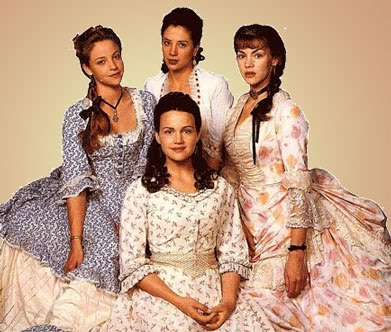
#edith wharton#edith wharton's the buccaneers#the buccaneers#the buccaneers 1995#maggie wadey#philip saville#carla gugino#cheri lunghi#greg wise#james frain#alison elliott#mira sorvino#rya kihlstedt#mark tandy#ronan vibert#richard huw#dinsdale landen#rosemary leach#gwen humble#peter michael goetz#conchata ferrell#michael kitchen#elizabeth ashley#james rebhorn#sheila hancock#jenny agutter#gilded age#victorian age#emily hamilton#connie booth
13 notes
·
View notes
Photo
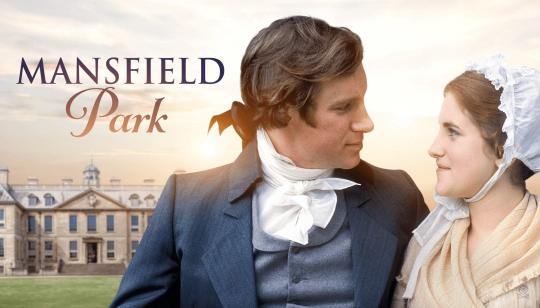
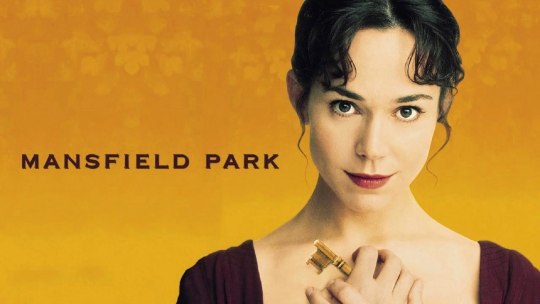
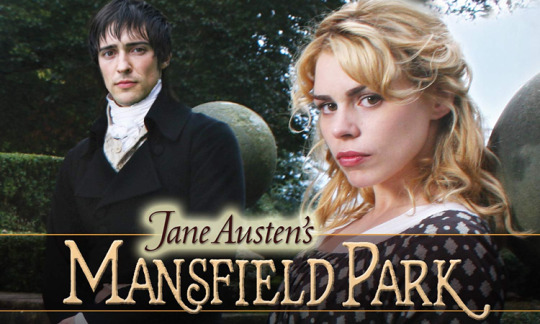
Mansfield Park
Adaptions from 1983, 1999, 2007
The third of Jane Austen’s novels, first published in 1814, has had a few adaptions over the years. The ones pictures above are detailed below:
Mansfield Park (1983 Miniseries)
6 episodes x 50 min
Written by Kenneth Taylor, directed by David Giles
Starring Sylvestra Le Touzel as Fanny Price, Nicholas Farrell as Edmund Bertram, Robert Burbage as Henry Crawford, Jackie Smith-Wood as Mary Crawford, Christopher Villiers as Tom Bertram, Samantha Bond as Maria Bertram, among others
Mansfield Park (1999 Film)
The film departs from the original novel in several points.
Written and directed by Patricia Rozema
Starring Frances O'Connor as Fanny Price, Jonny Lee Miller as Edmund Bertram, Alessandro Nivola as Henry Crawford, Embeth Davidtz as Mary Crawford, James Purefoy as Thomas Bertram Jr., Victoria Hamilton as Maria Bertram, among others
Mansfield Park (2007 TV Film)
The film departs from the original novel in some points.
Written by Maggie Wadey, directed by Iain B. MacDonald
Starring Billie Piper as Fanny Price, Blake Ritson as Edmund Bertram, Joseph Beattie as Henry Crawford, Hayley Atwell as Mary Crawford, James D'Arcy as Thomas Bertram, Michelle Ryan as Maria Bertram, among others
*****
I’m not big on M.P. and it’s been a while since I saw 2 of these, but I think each of these versions have their strong points (and also their own flaws).
#mansfield park#period drama#fanny price#edmundo bertram#jane austen adaptations#mansfield park 2007#mansfield park 1999#mansfield park 1983#I've heard there's a webseries but I haven't seen it yet
2 notes
·
View notes
Text
"MANSFIELD PARK" (2007) Review
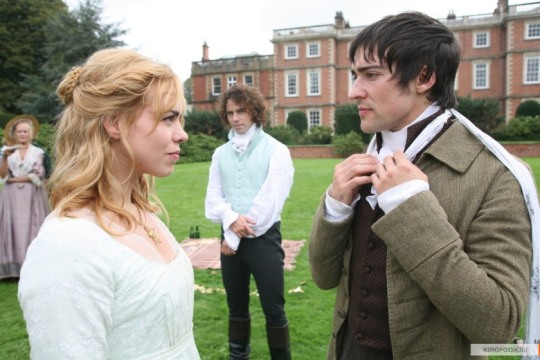
"MANSFIELD PARK" (2007) Review
There have been three screen adaptations of Jane Austen's 1814 novel, "Mansfield Park". And I have just finished viewing the most recent one - a ninety (90) minute television movie that first aired on the ITV network in March 2007.
As many Austen fans know, "MANSFIELD PARK" told the story of an English girl sent at the age of 10 to live with her maternal aunt and the latter's wealthy family at a vast estate called Mansfield Park. Fanny Price is treated as a poor relation of the Bertram family, as a semi-servant for her aunt, Lady Bertram. Only second son, Edmund, treats her with any real kindness. As a result, Fanny finds herself romantically in love with her cousin after eight years at Mansfield Park. Her feelings come to naught when the Bertram family becomes acquainted with a pair of sophisticated siblings named Henry and Mary Crawford. While Henry amuses himself with Fanny's cousins, Maria and Julia Bertram; Edmund falls in love with Mary, who returns his affections. Jealous over Edmund's romance with Mary, Fanny is oblivious of Henry's sudden interest to her. And when he makes it obvious with a proposal of marriage, Fanny finds herself divided between her true feelings about both Edmund and Henry, and her uncle Sir Thomas' desire to see her married to an eligible man of wealth.
"MANSFIELD PARK" was one of three Jane Austen adaptations aired by the ITV during the spring of 2007. All three movies possessed a running time of at least 90 minutes. Yet, for some reason, the production for "MANSFIELD PARK" seemed like a cheap television production, in compare to "PERSUASION" and "NORTHANGER ABBEY". It had nothing to do with the changes to Austen story, made by screenwriter Maggie Wadey. However, I do suspect that some of the changes were a result of the movie's budget. In fact, I am beginning to suspect that the budget had a lot to do with my dissatisfaction with "MANSFIELD PARK".
Of the three movies aired for ITV's "The Jane Austen Season", "MANSFIELD PARK" was the only one that was limited to one setting. Although Austen's novel was mainly set on the Bertram estate, it also included the Rushworth family's estate, Sotherton, the Mansfield Park parsonage occupied by Dr. and Mrs. Grant, and heroine Fanny Price's hometown of Portsmouth. Thanks to Wadey's script, the production did not include the setting of the Mansfield Park parsonage and Portsmouth. Henry and Mary Crawford were never seen at the parsonage. And to prevent shifting the setting to Portsmouth, Wadey's script allowed Sir Thomas Bertram to isolate Fanny at the estate . . . alone, instead of shipping her back to her immediate family in Portsmouth. This robbed the television viewers of a chance to meet Fanny's immediate family, aside from brother William. Another change was made by Wadey that seemed to reflect the movie's limited budget. Instead of a ball, a picnic was held in Fanny's honor by the Bertrams, following Maria Bertram's marriage to Mr. Rushworth. A picnic, instead of a ball. How cheap could one get?
Another aspect of "MANSFIELD PARK" that rubbed me the wrong way turned out to be the fast pacing. The television production moved at such a fast pace that I could barely blink before the scene featuring the Rushworths' wedding appeared. In fact, the entire story from Fanny's arrival at Mansfield Park to Maria's marriage to Mr. Rushworth seemed to move at an extremely fast and somewhat unsatisfying pace. If there is one thing about Wadey's script that did not move me one way or the other was its approach to the topic of slavery. She turned out to be the only screenwriter who adhered to Austen's novel. The 1999 movie allowed the topic of the Bertram family's participation in slavery to become a major theme in the movie. The 1983 miniseries completely ignored the subject. However, this version followed Austen's novel by allowing Fanny to question Sir Thomas about his role as a slave owner, before dropping the subject altogether.
Remember the outrage over Fanny Price's characterization in Patricia Rozema's 1999 adaptation of the novel? Well, there were some changes made by Wadey in this movie. Maggie O'Neill's portrayal of Fanny's Aunt Norris seemed less comic and broad than any other version I have encountered. Normally, I would applaud such a change. But one of the more entertaining aspects of "MANSFIELD PARK" has always been the use of Aunt Norris as a comic figure. O'Neill's Aunt Norris struck me as slightly boring. Also, Wadey's characterization of Mary Crawford struck me as slightly cold . . . darker. Portrayed by the talented Hayley Atwell, this version of Mary seemed to lack a sense of humor or true wit. Atwell's Mary never really tried to form a friendship with Fanny or display any kindness toward the latter. I got the feeling that Wadey deliberately portrayed Mary in this cold fashion to discourage sympathy or any other kind of positive feelings toward her. Because of this, Atwell was almost forced to portray Mary as a one-note villainess. Almost. Thankfully, the actress manage to somewhat rise the character above such mediocrity. Michelle Ryan made a lovely Maria Bertram. Unfortunately, her character failed to make an impact on the television screen, thanks to Wadey's limited handling of her character.
But not all of Wadey's characterizations irritated me. I liked her handling of the Lady Bertram character, portrayed by Jemma Redgrave. Instead of the vague and selfish woman portrayed by both Angela Pleasence and Lindsay Duncan, Redgrave portrayed Lady Bertram as a concerned parent and a woman with a deep interest in her children's love lives, if not their moral compasses. Douglas Hodge made a first-rate Sir Thomas Bertram, in all of his intimidating glory. He had taken the role as an homage to his mentor, actor/director Harold Pinter, who portrayed the role in Patricia Rozema's 1999 adaptation. James D'Arcy made an entertaining Tom Bertram. His sharp bon mots kept me smiling through most of the movie's first half. Rory Kinnear's portrayal of Mr. Rushworth seemed spot on. It seemed a pity that Wadey's script did not allow him the chance for a deeper characterization.
Both Blake Ritson and Joseph Beattie portrayed the two men in Fanny's life - her cousin Edmund Bertram and other suitor Mary Crawford. Ritson failed to make me like Edmund as a character. But this was no reflection on his skills as an actor. I simply dislike Edmund. But Ritson is the third actor to give an excellent performance in the role. He perfectly conveyed all of Edmund's traits that I heartily despise. When I first saw "MANSFIELD PARK", I was a little reluctant to praise Beattie's performance. I now realize that my judgement of his portrayal had been rushed. At first, he seemed like a womanizing stalker. But once his character began to fall in love in Fanny, Beattie conveyed a great deal of warmth and subtlety into the role.
Even Billie Piper's performance as Fanny Price seemed a lot different than Sylvestra Le Touzel and Frances O'Connor's extreme takes on the character. Due to Wadey's script and Piper's portrayal was not Le Touzel's wooden Fanny or O'Connor's Jane Austen 2.0 characterization. Piper's Fanny was quiet, but without the passive aggression that I found so exasperating in Austen's novel. When I first saw "MANSFIELD PARK", I believed that Piper's Fanny also lacked the hypocrisy of the previous version. I realize that I had blinded myself from what was obvious on the screen. Although Fanny did not indulge in heavily criticizing Mary Crawford behind the latter's back or hid her dislike and jealousy behind a facade of moral outrage; she did express hypocrisy. Like her predecessors, Piper's Fanny failed to be honest with Henry Crawford about the real reason behind her rejection of his marriage proposal.
Visually, "MANSFIELD PARK" is beautiful to behold. Nick Dance's photography was sharp and filled with beautifully lush colors. It is a pity that the movie's budget limited it to one setting. Tim Hutchinson's production designs contributed to Dance's lush photography of Newby Hall in Yorkshire, which served as the Bertram estate. And Mike O'Neill's costume designs were absolutely beautiful - especially those costumes for the Bertram women and Mary Crawford.
What is my final verdict of "MANSFIELD PARK"? Honestly? Of the three movies for ITV's "Jane Austen's Season", it seemed the least impressive. It could boast some first-rate performances, along with great costumes and photography. Unfortunately, the movie's fast pacing in the first half and its limited budget did not serve it well. In the end, I believe "MANSFIELD PARK" could have benefited from a longer running time and bigger budget.
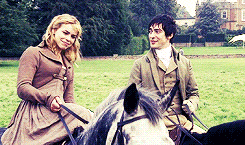
#jane austen#mansfield park#mansfield park 2007#billie piper#blake ritson#joseph beattie#michelle ryan#jemma redgrave#douglas hodge#hayley atwell#rory kinnear#maggie wadey#james d'arcy#tara berwin#catherine steadman#william price#maggie o'neill#joseph morgan
6 notes
·
View notes
Text
Jane Austen Summer, bby
In the past few months, I've been on a little project to watch (and re-watch) as many Austen adaptations as I can. This was sparked by my best-friend and I re-reading all the novels together. And then further ignited after watching A Very Bridget Jones' Persuasion (aka 2022 Persuasion with Dakota Johnson).
If you want to send me any asks about my adaptation thoughts ... I would not say no to that!
Thus far I have watched:
Pride and Prejudice (1995, BBC series, screenplay by Andrew Davies)
Mansfield Park (1999, film, screenplay by Patricia Rozema)
Mansfield Park (2007, ITV film, screenplay by Maggie Wadey)
Sense and Sensibilty (1995, film, screenplay by Emma Thompson)
Sense and Sensibility (2008, BBC series, screenplay by Andrew Davies)
Emma* (1996, film, screenplay by Douglas McGrath)
Emma (1996, ITV film, screenplay by Andrew Davies)
Emma (2009, BBC series, screenplay by Sandy Welch)
Emma* (2020, film, screenplay by Eleanor Catton)
Northanger Abbey (2007, ITV film, screenplay by Andrew Davies)
Persuasion* (2022, film, screenplay by Ronald Bass and Alice Victoria Winslow)
*denotes version I watched for the first time.
Next up are the '95 and '07 Persuasions (waiting on them from the library). And then I shall turn my attention to adaptations of Little Women.
Also, you may note that 2005 Pride and Prejudice is not on the list. No, I have not seen it. Yes, it's complicated.
10 notes
·
View notes
Text
Sunday Snippet
@wadey-wilson tagged me to share a snippet of my WIP. I FINALLY finished Chapter Four of Arise, Fair Sun in the wee hours of the morning and sent the draft away to Maggie, so here’s a tease of what’s to come...
“Louis, pivot him a half turn here, so he finishes upstage of you,” Liam directs, still all business. “And then Harry, you go back down to flat feet, breaking the kiss.”
Harry lowers back down to the floor, taking a step back from Louis. Louis holds his gaze for a bit too long and a funny feeling settles in the pit of Harry’s stomach.
“It should be like, your mind finally catches up with your body,” Liam continues, completely oblivious, “and you get a little bashful about it and then turn and run back up the stairs to your balcony for the end of the scene. The whole segment, from the moment Louis stops you from running away to the end of the pas de deux is just about sixty seconds.”
Sixty seconds. It sounds like nothing, but it can actually feel like an eternity when you’re on stage.
“How, um,” Harry starts, feeling a little silly but also knowing the professional thing to do in this situation is to establish boundaries. “How real do you want the kiss to be?”
“That’s completely up to you,” Liam answers, looking between them. “I want you to be comfortable, of course, that’s the most important thing. So as long as you’re conveying the emotion of the scene, whatever works for the two of you works for me.”
Harry looks at Louis, who shrugs.
“I’m fine with anything,” Louis shrugs, looking completely unbothered.
Well then.
“Me too,” Harry says evenly.
“Open mouth?”
“Sure. Fine. Why not?”
“Tongue?”
“Tongue?” Harry parrots, wrinkling his nose. “Really, Louis?”
“Give me a break, princess,” Louis says, rolling his eyes. “I’m not gonna shove my tongue down your throat or anything like that. But shouldn’t there be a little tongue? With the whole going en pointe thing? There should be a build to the kiss, right? It’s supposed to be passionate.”
Louis does have a point.
Harry hates that he has a point.
He also hates that it feels like Louis is daring him.
“Fine,” Harry concedes, never one to back down from a challenge. “There can be a little tongue. Stage tongue, not porno tongue.”
“Did you just quote The Wedding Singer?”
“Maybe I did,” Harry replies, tilting his chin up. “Well, sort of.”
“Just making sure,” Louis grins. “Okay, stage tongue it is.”
Tagging @disgruntledkittenface @kingsofeverything @louandhazaf @allwaswell16 @justalarryblog @uhoh-but-yeah-alright @haztobegood @hazzabeeforlou @sadaveniren @reminiscingintherain @jacaranda-bloom @justalarryblog @oldbay-on-apples @indiaalphawhiskey @myfineline and @absoloutenonsense to share if they wish!
#Arise Fair Sun#FINALLY THEY KISSED#god#It took me long enough#Sunday Snippet#no I am not gonna share the actual kiss yet!#can't give away the farm
62 notes
·
View notes
Text
last line challenge
@disgruntledkittenface tagged me and i’ve been writing all afternoon. here’s my last line from my @soulmatesabroad fic:
Christmas Eve is sunny and warm and Louis lounges around the cottage in nothing but his boxers until lunchtime.
19 words........ tagging you back Maggie! and @justalarryblog @mercurial-madhouse @zanniscaramouche @dinosaursmate @louandhazaf @londonfoginacup @lululawrence @noellehenrymain @tommosgun @wadey-wilson @vintageumbroshirt @reminiscingintherain @sunflowervolh @comebackassholes @laynefaire @crinkle-eyed-boo @jacaranda-bloom @uhoh-but-yeah-alright @fallinglikethis
15 notes
·
View notes
Text
sunday snippet
Thank you @disgruntledkittenface and @wadey-wilson for tagging me! I have not been doing a lot of my own writing over the last month, so here’s something I’ve been going back and forth on sharing for a while.
It takes place before the start of my vampire au But If This Ends, and contains spoilers. If you haven’t read it and don’t want the plot to be spoiled, I would skip over reading this!
*
Two vodka sodas, one gin and tonic, two lagers, one ale, one stout, seven Washington Apple shots.
It’s a busy night at the bar -- the busiest Harry’s had since he started working here a couple of weeks ago. Jade has been truly wonderful about it, especially seeing as Harry just sort of showed up randomly and asked to see what the whole bar business was about. She’d asked quite a few times why now, and Harry didn’t really have a good answer, other than he’d had the idea take over his mind for the last five years or so and he decided it was time to dive in.
It’s been hundreds of years since Harry worked in a bar, so he’s a bit rusty, but he finds nothing’s really changed about the job. Make drinks, take money, banter with customers… it’s all stuff he’s good at. He just wasn’t totally sure about the owning portion of it. He’s got various properties around the world (houses and buildings for rent, mostly) but from what he’s heard from Jade, this kind of business is much more hands-on. It might be good for a change of pace.
“There you are,” Harry says to the group in front of him, placing the last of the seven shots down.
“Can we open a tab?” one of the blokes says to him, holding his card out like he’s bored already.
Harry tries not to let the annoyance show on his face as he takes it. “Sure. I’ll keep the card and run it when you’re ready to wrap up.”
The bloke nods, but Harry catches him rolling his eyes as he turns around. He wishes he could do the same, but instead he goes up to Jade at the POS.
“What’s our policy on eating customers who are rude?” he asks.
Jade laughs and finishes adding the drinks to the tab open on the screen. “Zero tolerance on eating customers.”
“Even if I Charm them after?”
“Even then.”
“Rats,” Harry says, snapping his fingers.
She laughs again and pats him on the shoulder. “Just becomes a part of the gig. You’ll get used to it. Luckily, the arseholes are few and far between here.”
“I’m going to hold you to that,” he says, swiping the card before starting to add the drinks he made to the new tab.
A shiver runs up his spine all of a sudden and everything goes a bit fuzzy as clicks the button for the ale. Shaking himself out of it, he is able to zone back in and look for the shots on the screen.
“Louis!” he hears Jade say behind him. “How were your holidays?”
“Brilliant, and over much too quickly,” a light, musical voice says. It’s thickly accented and playful. Another shiver up Harry’s back. He pauses, staring at the screen. The voice continues, “I missed you terribly, of course.”
“You’re a liar,” Jade says. “You didn’t miss me one bit.”
“Missed you once the plane landed again,” he laughs.
Harry wants to turn around. Desperately, he wants to turn around, to check if it’s… but what if it’s not?
“What’re you having?”
“Got anything new since I was in last?”
“Got a raspberry ale on draft. Kind of like a sour, but not as tart.”
“Perfect, I’ll have one of them. I’ve been drinking fruity cocktails for two weeks, that’ll be a nice transition.”
“You got it. H, could you ring up an ale under Zayn and Liam’s tab?”
Without actually deciding to do it, Harry’s head turns, eyes skimming right past Jade until they land on an absolutely stunning shade of blue.
He’s got brown hair swept across his forehead and scruff covering his sharp jawline. The skin is tanned a beautiful golden shade, giving him a glow and highlighting his defined cheekbones. As soon as they make eye-contact, he smiles wider, crinkles appearing next to his blue eyes as he looks Harry up and down. Harry is immediately hooked into him.
His sunshine in front of him again, giving off waves and waves of playfulness and curiosity and fun. Harry feels his whole body turn as he smiles back. It hurt so much to say goodbye to Maggie, to have his sunshine here in front of him again after so long… nearly thirty years, he realizes.
“Harry?” Jade asks, pulling him out of his reverie.
“Huh?” he hums. After another moment he looks at her, with her raised eyebrow and amused smile. He looks down to her hand, holding the ale. Ale. Right, his job. Adding the beer to the tab. “Sorry, yes. Adding that to a tab.”
“Zayn and Liam’s tab,” she confirms, eyes lit up like this is the funniest thing she’s seen all week. Oh boy.
“Yes,” Harry says nodding. He looks at his sunshine again before tearing his eyes away back to the screen.
“Thanks Jade,” he says.
Harry closes his eyes and takes a few moments to breathe. When he opens them, he finishes adding the drinks to the original tab he created, and then adds the raspberry ale to Zayn and Liam’s tab.
“His name is Louis,” Jade says, suddenly beside him.
“Huh?”
“Come off it.” She pushes at his shoulder lightly. “You have that same dopey look on your face as you did that one time I saw you with Elijah.”
Fuck is it that obvious? Harry supposes he shouldn’t be surprised. He could never keep his cool when it comes to his loves.
“He’s gorgeous, isn’t he?” she continues. “He’s an editor for a food magazine. Been coming here for about ten years now.”
“That’s… um, thank you,” Harry interrupts her. He doesn’t want to be told by anyone but him though. He wants to learn everything he can on his own, savour those moments between them, be able to fall in love the way they usually do. Well, Harry is definitely already in love, but that’s hardly the point.
“Alright, alright,” Jade says, throwing her hands up. “I’ll leave you to it however you want. Or don’t want.”
Oh, no, Harry definitely wants. His eyes automatically drift around the room until he lands on him. Louis. He’s just now sitting down in the last booth at the end of the room. He tips his head back and laughs at something someone’s said. Harry’s hook lets him hear his voice immediately, like he’s in front of him and not all the way across the room.
“Fucking wankers, leave me be, I only just got back,” he says.
Others are speaking, but Harry’s so enraptured by Louis that he can’t concentrate long enough to tune into what they’re saying.
“Hm?” he asks. And then he’s turning around, making eye-contact with Harry. He smirks immediately.
Harry turns away abruptly at being caught. Fuck, that’s not a good first impression, is it?
“Yeah, he’s hot. What’s his deal then?”
There are people waiting to order drinks, but Harry’s not in the right mind to make anything right now. He ducks down and pretends to be looking for something in one of the refrigerators.
“Ah, I see,” Louis says, voice a bit wary then.
What is there to see, though? What did they say? Harry scolds himself for not being prepared, even if there was no real way to prepare.
“Bet I could get him. Tonight even.” A pause. He laughs. “Well yeah, I’m just back from holidays. Still riding that high, aren’t I?” Another pause. “Don’t be such a twat. Watch and learn, boys.”
There’s no more from him then, but the energy is determined and wanting. Harry waits. And waits. And waits--
“Hi,” Louis says. Harry jerks back, catching the top of his head on the bottom lip of the bar as he stands. “Woah, there.” Harry curses and tries to reorient himself quickly as Louis looks on at him, concerned. “You okay?”
“Yep, yes, yeah, I’m fine. Um. Sorry. What, uh, what can I get for you?”
Louis smirks at him, watching Harry rub at the spot he hit before pulling his hand down. “Was hoping you could make some shots for me and my mates.”
“Yes, yeah of course. What would you like?”
Louis bites his lip and looks up from his lashes. Harry feels enraptured by the way the light seems to catch his face seamlessly no matter how he tilts his head.
“Something new. Something fun,” he says. “Been on my hols and I’m not quite ready to leave that.”
Harry nods, looking down at the way his bottom lip shines for a quarter of a second before looking back to his eyes. “Lemon drops?” he offers.
Louis shakes his head slowly, eyes bright. “I want something a little more. Something I can feel on my tongue. Something I can savour.”
Harry swallows. “Jager bomb?”
“Mmm,” he hums, thinking. “That certainly would give me a mouthful.”
Harry nods dumbly. Fuck, he needs to get himself together.
“Alright, then, three Jager bombs,” Louis says.
Harry immediately starts grabbing the special cups for those shots. He finishes pouring the last of the Red Bull. “Anything else?”
“Yeah, your number, if you don’t mind.”
He takes a deep breath in. “My number?”
Louis nods. “Yeah. I feel like you’ve got a few more suggestions on other things I might like. Not sure we could cover all of them here at the bar.”
His number. Yes, a thousand percent yes. This is the absolute fastest any of his loves have shown direct interest in him, and Harry’s not about to waste even a moment of not being together if Louis doesn’t want to wait.
“H,” Jade calls out. “We need some help here.” He looks over his shoulder to see a buildup of people waiting to order drinks.
Right, his fucking job. His job that he got because something was telling him to come here. Someone. God he’s wasted so much of his own time.
“Sorry,” he calls out. He turns back to Louis, who’s looking him up and down again. “How about I give you my number a bit later? I’ve just got to--”
“Of course,” Louis says, an easy smile on his face. He picks up the shots and turns so he’s looking at Harry over his shoulder. “Come find me when you’re ready.”
#vampire au#snippet#idk if you can really call this a snippet actually#it's like 1600 words whoops#anyway... enjoy?
16 notes
·
View notes
Note
The 2007 Mansfield Park is SO much better than the 1999 one, which is sexist because Frances O'Connor has smaller tits than Billie Piper. And all the slavery stuff and bird imagery was so extraneous! Having Edmund realize he loves Fanny because she picked purple thread over maroon had so much symbolism, and the waltz had so many Freudian layers! Maggie Wadey's the only person who should ever adapt Austen, Iain B. MacDonald is a cinematic god, and if another opinion exists I may eat my own hair.
Ahhhhh you crazy son of a bitch, you had me going for a minute there!

17 notes
·
View notes
Text
The English Daughter
As a child, writer Maggie Wadey was aware her mother was different from her father and his family, and that the difference was do with her Irishness, but she knew nothing of her Tipperary background. Then, before she died, Agnes Kavanagh began to talk about the past. Gradually, Maggie began to piece together her mother’s early life. But it was only after Agnes’s death that she discovered another…
View On WordPress
0 notes
Photo

New Audiobook has been published on http://www.audiobook.pw/audiobook/the-english-daughter-2/
The English Daughter
As a child, writer Maggie Wadey was aware her mother was different from her father and his family, and that the difference was do with her Irishness, but she knew nothing of her Tipperary background.
Then, before she died, Agnes Kavanagh began to talk about the past. Gradually, Maggie began to piece together her mother’s early life. But it was only after Agnes’s death that she discovered another story – a life and a secret hidden in layers of silence.
0 notes
Text
“MANSFIELD PARK” Adaptations

“Mansfield Park” (1983); Directed by David Giles and written by Ken Taylor

“Mansfield Park” (1999); Written and directed by Patricia Rozema

“Mansfield Park” (2007); Directed by Iain B. MacDonald and written by Maggie Wadey
#jane austen#mansfield park#mansfield park 1983#sylvestra le touzel#nicholas farrell#jackie smith-wood#mansfield park 1999#patricia rozema#frances o'connor#embeth davidtz#mansfield park 2007#maggie wadey#billie piper#blake ritson#joseph beattie
4 notes
·
View notes
Text
“NORTHANGER ABBEY” Adaptations

“Northanger Abbey” (1986); Directed by Giles Foster and directed by Maggie Waddey

“Northanger Abbey” (2007); Directed by Jon Jones and written by Andrew Davies
#northanger abbey#northanger abbey 1986#northanger abbey 2007#giles foster#jon jones#maggie wadey#andrew davies#katherine schlesinger#peter firth#ingrid lacey#felicity jones#j.j. feild#jane austen
5 notes
·
View notes
Text
“NORTHANGER ABBEY” (1986) Review

"NORTHANGER ABBEY" (1986) Review
Most movie and television adaptations of Jane Austen’s novels are either highly acclaimed or perhaps even liked by fans and critics alike. I can only think of two or three adaptations that have been dismissed them. And one of them happened to be the 1986 A&E Network/BBC adaptation of Austen’s 1817 novel, "Northanger Abbey".
Adapted by Maggie Wadey, "NORTHANGER ABBEY" follows the experiences of seventeen-year-old Gothic novel aficionado, Catherine Morland, who is invited by her parents’ friends, Mr. and Mrs. Allen, to accompany them on a visit to Bath, England. This is Catherine’s first visit to Bath and there she makes new acquaintances such as Isabella Thorpe and the latter’s crude brother, John. She also becomes friends with the charming and quick-witted clergyman Henry Tilney and his sweet-tempered sister, Eleanor. While Catherine’s brother James courts Isabella, she finds herself becoming the romantic target of the ill-mannered John. Fortunately for Catherine, she becomes romantically captivated by Henry Tilney, who seemed to have fallen for her, as well . . . much to the displeasure of the Thorpes. Eventually, Henry and Eleanor’s father, General Tilney, invites Catherine to visit their estate, Northanger Abbey. Because of her penchant for Ann Radcliffe's gothic novel, "The Mysteries of Udolpho", Catherine expects the Tilney estate to be filled with Gothic horrors and family mysteries. Instead, Catherine ends up learning a few lessons about life.
Personally, I do not consider the 1817 novel to be one of Austen’s best. It has always seemed . . . not fully complete to me. I never understood why the Thorpes actually believed that the Morlands were wealthy, considering John’s longer acquaintance with Catherine’s brother, James. And why did John tell General Tilney that Cathrine’s family was wealthy in the first place? For revenge? His actions only encouraged the general to invite Catherine to Northanger Abbey. But I digress. This article is not a criticism of Austen’s novel, but my view on this first movie adaptation. And how do I feel about "NORTHANGER ABBEY"? Well . . . it was interesting.
There are aspects of "NORTHANGER ABBEY" that I liked. First of all, director Giles Foster had a first rate cast to work with. I cannot deny that the movie featured some top-notch and solid performances. Both Katharine Schlesinger and Peter Firth gave first-rate performances as the two leads, Catherine Morland and Henry Tilney. Now, I realize that many Austen fans had a problem with Firth’s characterization of Henry. And they are not alone. But I cannot deny that he did a great job with the material given to him. Best of all, not only did Schlesinger and Firth have great screen chemistry, but also exchanged one of the best kisses I have ever seen in an Austen adaptation. But if I must be honest, there was not a performance that failed to impress me. The entire cast were excellent, especially Robert Hardy as Henry’s perfidious father, General Tilney; Cassie Stuart as Isabella Thorpe; Ingrid Lacey as Eleanor Tilney; and Jonathan Coy as the vulgar John Thorpe.
Watching "NORTHANGER ABBEY", it occurred to me that its production values were superb. Truly. I noticed that the movie seemed to be set in the late 1790s – the period in which Austen first wrote the novel, instead of the late Regency era (when it was officially published). Cecilia Brereton really did justice in re-creating Bath in the late 1790s. My two favorite scenes – from an ascetic point-of-view – featured Catherine’s meetings with the Thorpes and Eleanor Tilney at the city’s Roman Baths; and the two assembly balls. Nicholas Rocker did a superb job in designing the movie’s colorful costumes. In fact, I adored them. The costumes, the hairstyles and even the makeup designed by Joan Stribling beautifully reflected the movie’s setting.
Now that I have waxed lyrical over "NORTHANGER ABBEY", it is time for me to tear it down. Despite some of the movie’s more positive aspects, I can honestly say that I do not like this film. I almost dislike it. There were too much about it that turned me off. Surprisingly, one of those aspects was the characterization of Henry Tilney. The novel had hinted a witty and playful man with a wicked sense of humor. The sense of humor remained, but Henry’s condescending manner toward Catherine and penchant for lectures really turned me off. I cannot blame Peter Firth. I do blame Maggie Wadey for transforming Henry from a man with a wicked sense of humor, to a slightly humorous, yet ponderous character. And why did Wadey transform the vulgar John Thorpe into a borderline stalker? Honestly, the way he eyed Catherine whenever Henry was in her midst made me believe he would be a first-class serial killer. I also believe that Wadey went too far in her characterization of General Tilney. Instead of being a stern and rigid tyrant, the general became an aging and mercenary Lothario, whose dissipation depleted the family’s income. Artistic close-ups of Robert Hardy’s face wearing a salacious expression did not help matters. To reinforce General Tilney’s dissipation, Wadey included a character called the Marchioness, an aristocratic refugee of the French Revolution who has become his mistress. Personally, I found her addition to the cast of characters to be irrelevant.
And the problems continued to roll. The main house of the Tilneys’ estate is supposed to be an abbey, not a castle. Why on earth did the production designer and the producers choose Bodiam Castle as the location for the fictional Northanger Abbey? The scenes featuring Catherine’s vivid and "Gothic" imagination struck me as unnecessarily long and rather off-putting. I felt as if I had stumbled across a horror movie, instead of a Jane Austen adaptation. Also, Catherine’s friendship with Isabella seemed to have been given the short-shrift. Quite frankly, I do not think it was developed very well. Wadey had a chance to clean up some of the flaws in Austen’s novel – namely the Thorpes’ interest in Catherine and the trick that John Thorpe played on General Tilney about the Morelands’ wealth or lack of it. And why did Wadey include that minor sequence featuring the Tilneys’ young black slave? All the kid did was lure Catherine outside to the estate’s lawn in order to impress her with his gymnastic skills. And for what? I am trying to think of a witty comment to express my contempt for this scene. All I can do is shake my head and wonder what the hell was Wadey thinking.
Who was responsible for hiring Ilona Sekacz to compose the movie’s score? I wish I could compliment Ms. Sekacz’s work. I would if it had served as the score for an episode of "MIAMI VICE", a soft porn movie, or some other television series or movie from the 1980s. Sofia Coppola used early 1980s pop music to serve as the score for her 2006 movie, "MARIE ANTOINETTE". Surprisingly, it worked. I think it worked because Coppola utilized the right song for the right scene. But Sekacz’s score, which featured a strange mixture of new age and period music, night club jazz, and synthesizers, was never utilized properly. Or perhaps I simply found the music too strange or off-putting for me to appreciate it. It certainly did not blend well with the actual movie released on American and British television.
"NORTHANGER ABBEY" has some aspects that prevents me to viewing it as a total write-off. It does feature some first-rate performances – especially from leads Katharine Schlesinger and Peter Firth – and I adore both Cecilia Brereton’s production designs and Nicholas Rocker’s costumes. But the movie has too many flaws, including an unpalatable score and some very questionable characterizations, for me to consider it a first-class, let alone a decent adaptation of Austen’s novel. This is one movie that I will not be watching with any regularity.

#jane austen#northanger abbey#northanger abbey 1986#katherine schlesinger#peter firth#maggie wadey#giles foster#robert hardy#cassie stuart#jonathan coy#elaine ives-cameron#ingrid lacey#googie withers#greg hicks#bath england#period drama
4 notes
·
View notes
Text
Six sentence Sunday
The lovely Maggie @disgruntledkittenface just tagged me in this and since I finally have sentences I can share and I’m currently freaking out about accidentally stealing someone else’s plot, have 6 sentences from my Magnum PI AU:
“Well done, Mister Styles,” Louis says, taking a step back when Harry turns the stolen key in the ignition and the Ferrari engine roars to life.
“All in a day’s work,” Harry says with a wink, smoothing his damp mustache. “And please, call me Harry.”
“I don't think so, Styles,” Louis says, huffing a laugh and shaking his head. “I’ve heard all about you, and I wouldn’t want you to think I’m anything like the regular guests at this estate.”
“Polite?” Harry laughs and reverses the Ferrari out of the portico just as the dobermans reach the driveway.
Tagging @homosociallyyours @bottomlinsons @wadey-wilson @absoloutenonsense if you’ve got something to share
11 notes
·
View notes